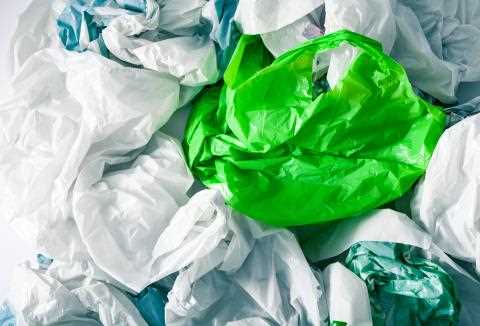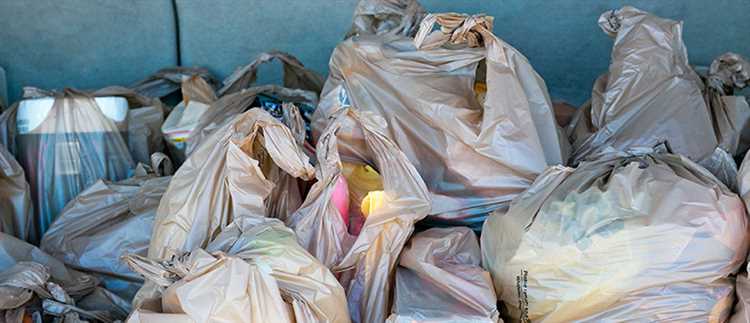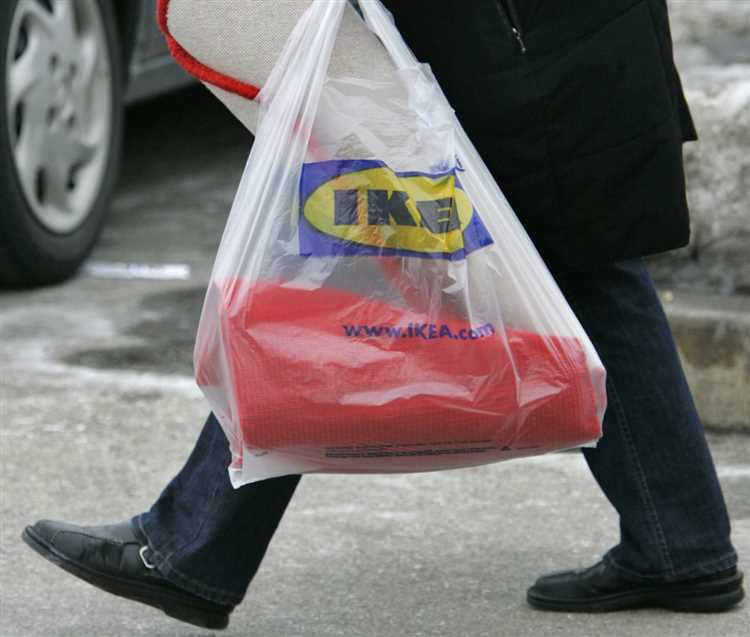
Pennsylvania is considering joining the growing list of states that are implementing a ban on plastic bags. The state has seen a significant increase in plastic waste in recent years, and lawmakers are looking for ways to reduce its impact on the environment. A proposal to ban single-use plastic bags is currently making its way through the state legislature, with supporters arguing that it would be a crucial step towards a more sustainable future.
Plastic bags have become a major environmental concern in Pennsylvania, just as they have in many other parts of the country. These bags are not biodegradable and can take hundreds of years to break down, posing a threat to wildlife and ecosystems. In addition, they contribute to the global plastic pollution crisis that is affecting our oceans and landfills.
The proposed ban would require retailers to switch to reusable or paper bags, encouraging consumers to bring their own bags or purchase alternatives. While some argue that this may inconvenience shoppers, others believe that it is a necessary step to protect the environment and move towards a more sustainable future. Similar bans have already been implemented in states such as California and New York, with positive results in reducing plastic waste.
Proponents of the ban believe that it will not only reduce the amount of plastic waste in the state, but also promote the use of more sustainable alternatives. By encouraging the use of reusable bags, Pennsylvania can take a significant step towards reducing its carbon footprint and protecting natural resources.
- Current State of Plastic Bag Use in Pennsylvania
- Plastic Bag Usage in Pennsylvania
- The Cost of Plastic Bag Pollution
- Potential Impacts of a Plastic Bag Ban
- Efforts to Reduce Plastic Bag Waste in Pennsylvania
- Pros and Cons of Banning Plastic Bags
- Similar Policies in Other States
- California
- New York
- Hawaii
- Question-answer:
- Is Pennsylvania planning to ban plastic bags?
- Why is Pennsylvania considering banning plastic bags?
- Will the ban on plastic bags apply to all stores in Pennsylvania?
- When will Pennsylvania implement the ban on plastic bags?
- How will Pennsylvania enforce the ban on plastic bags?
- Is Pennsylvania planning to ban plastic bags?
Current State of Plastic Bag Use in Pennsylvania
Pennsylvania, like many other states in the United States, is facing the challenge of plastic bag pollution. Plastic bags are lightweight, inexpensive, and convenient, making them a popular choice for consumers. However, their durability and slow decomposition rate have led to widespread environmental concerns.
Plastic Bag Usage in Pennsylvania
Currently, there are no statewide bans or restrictions on plastic bags in Pennsylvania. However, some cities and municipalities have taken action to limit their use. For example, Philadelphia passed a ban on single-use plastic bags in 2020, requiring retailers to charge customers for each bag they provide. This measure aims to encourage the use of reusable bags and reduce plastic waste.
Despite the lack of a statewide ban, there have been growing efforts to address plastic bag pollution in Pennsylvania. Several local governments have introduced similar ordinances and initiatives to discourage plastic bag use and promote eco-friendly alternatives. These initiatives include offering incentives for using reusable bags and promoting education on the environmental impact of plastic bags.
The Cost of Plastic Bag Pollution
The environmental impact of plastic bags is significant. They contribute to pollution in waterways, pose risks to wildlife, and clog landfill sites. The convenience of plastic bags comes at a high cost to the environment, as they can take hundreds of years to decompose.
| Environmental Impact | Plastic Bag Usage Statistics |
|---|---|
| Pollution in waterways | In 2019, an estimated 1.9 million pounds of plastic bags were collected along Pennsylvania’s waterways. |
| Wildlife risks | Plastic bags can entangle and suffocate animals, causing harm to marine life and birds. |
| Landfill clog | Plastic bags are a significant contributor to landfill waste. They do not biodegrade but instead break down into smaller microplastics. |
Given the negative impact of plastic bag pollution, there is a growing consensus among policymakers and environmental advocates to address this issue. While no statewide ban is currently in place, the actions taken by individual municipalities and cities in Pennsylvania demonstrate a commitment to reducing plastic bag usage and promoting sustainable alternatives.
In conclusion, Pennsylvania is grappling with the environmental consequences of plastic bag use. While there is currently no statewide ban, various local governments have implemented measures to restrict plastic bag usage. The detrimental effects of plastic bag pollution highlight the need for continued efforts to find more environmentally friendly solutions.
Potential Impacts of a Plastic Bag Ban

Implementing a plastic bag ban in Pennsylvania could have significant impacts on both the environment and the economy of the state. Here are some potential effects:
1. Reduction in Plastic Waste:
A ban on plastic bags would lead to a significant reduction in plastic waste. Plastic bags are one of the most common types of litter found in the environment and they pose a major threat to wildlife. By eliminating their use, we can reduce the amount of plastic pollution and protect our natural resources.
2. Increased Use of Reusable Bags:
A plastic bag ban would encourage consumers to switch to reusable bags, such as cloth or canvas bags. This shift would promote sustainability and reduce the demand for single-use plastics. Reusable bags are durable and can be used multiple times, reducing the environmental impact associated with disposable plastic bags.
3. Boost to Local Businesses:
Implementing a plastic bag ban can benefit local businesses. It can create opportunities for companies that manufacture and sell reusable bags. Additionally, businesses that offer alternatives to plastic bags, such as paper bags or biodegradable bags, may see an increase in demand. This ban can stimulate the growth of a more sustainable economy in Pennsylvania.
4. Transition Challenges:
While implementing a plastic bag ban may have long-term benefits, it can also pose certain challenges in the short term. Some consumers may initially resist the change and may find it inconvenient to carry reusable bags. Additionally, businesses that rely heavily on plastic bags may face initial difficulties in finding alternatives. However, with proper planning and education, these challenges can be overcome.
5. Positive Public Perception:
Implementing a plastic bag ban can demonstrate a commitment to environmental sustainability and generate positive public perception. It can position Pennsylvania as a leader in environmental initiatives and attract environmentally conscious residents and tourists to the state. This ban can also inspire other states to take similar actions, leading to a broader movement towards reducing plastic waste.
In conclusion, a plastic bag ban in Pennsylvania can have a range of potential impacts, including reduced plastic waste, increased adoption of reusable bags, economic opportunities for local businesses, temporary transition challenges, and a positive public perception. It is important to carefully consider these potential consequences when evaluating the implementation of such a ban.
Efforts to Reduce Plastic Bag Waste in Pennsylvania
Pennsylvania is taking significant steps to address the issue of plastic bag waste and promote environmentally friendly practices. Various initiatives and regulations are being implemented to reduce the usage of plastic bags and encourage the use of reusable alternatives.
One of the key efforts in Pennsylvania is the proposed legislation to ban single-use plastic bags. The state government is evaluating the implications and potential benefits of such a ban, considering factors like environmental impact, economic consequences, and public opinion. Supporters argue that banning plastic bags would reduce litter, protect wildlife, and promote a shift towards more sustainable practices.
In addition to the potential ban, Pennsylvania is also focusing on promoting recycling and encouraging the use of reusable bags. Many cities in the state have implemented recycling programs specifically targeting plastic bags. These programs aim to educate the public about the importance of recycling plastic bags and provide convenient drop-off locations for their disposal.
Furthermore, Pennsylvania is working with retailers to encourage the use of reusable bags. Some stores offer incentives like discounts or loyalty points for customers who bring their own bags. These efforts aim to raise awareness about the environmental impact of plastic bags and encourage individuals to make more eco-friendly choices.
Another important aspect of reducing plastic bag waste in Pennsylvania is community engagement. Organizations, schools, and local groups are actively promoting awareness campaigns and educational initiatives to help individuals understand the negative effects of plastic bags on the environment. These efforts aim to empower individuals to take responsibility for their choices and adopt sustainable habits.
Overall, Pennsylvania is committed to reducing plastic bag waste through a combination of regulations, recycling programs, retailer partnerships, and community engagement. These efforts aim to create a more sustainable future and protect the environment for generations to come.
Pros and Cons of Banning Plastic Bags
Pros:
1. Environmental Preservation: One of the biggest advantages of banning plastic bags is the positive impact it has on the environment. Plastic bags are non-biodegradable and contribute to pollution, particularly in bodies of water. By banning plastic bags, we can reduce the amount of plastic waste and protect our ecosystems.
2. Conservation of Resources: Plastic bags are made from fossil fuels and require a significant amount of energy to produce. By banning plastic bags, we can conserve natural resources and reduce our dependence on fossil fuels. This can contribute to a more sustainable future.
3. Promotion of Alternatives: Banning plastic bags encourages the use of alternative, more eco-friendly options such as reusable bags. Reusable bags are more durable and can be used multiple times, reducing waste and the need for single-use plastic.
Cons:
1. Economic Impact: Banning plastic bags may have negative economic consequences, particularly for businesses that rely heavily on the use of plastic bags. Finding suitable alternatives may require additional financial investments, and small businesses may struggle to adapt to the changes.
2. Convenience: Plastic bags are often praised for their convenience and portability. Banning them may require individuals to carry their own reusable bags, which could be seen as an inconvenience for some. This may result in resistance or pushback against the ban.
3. Public Health Concerns: While plastic bags are harmful to the environment, they do provide a certain level of protection for the items they carry. Banning plastic bags may increase the risk of contamination and spread of germs, particularly for certain types of products (e.g., raw meat).
Overall, banning plastic bags has several environmental benefits, such as reducing pollution and conserving resources. However, the ban may have economic implications and raise concerns about convenience and public health. Finding a balance between these factors is crucial when considering the implementation of a plastic bag ban.
Similar Policies in Other States
Pennsylvania is not the only state considering or implementing a ban on plastic bags. Several other states have taken action to reduce plastic bag usage in an effort to protect the environment.
California

California became the first state in the United States to ban single-use plastic bags in 2014. The law prohibits certain retailers from providing customers with single-use plastic bags and requires them to charge a fee for reusable or recycled paper bags. The aim of the ban is to reduce litter and plastic pollution in California’s waterways and landfills.
New York
New York passed a ban on single-use plastic bags in 2020, but implementation was delayed until 2022 due to legal challenges. Under the ban, retailers are prohibited from providing customers with thin plastic bags, but they can provide reusable bags for a fee. The ban aims to reduce plastic waste and encourage the use of reusable bags.
Hawaii
Hawaii implemented a statewide ban on plastic bags in 2015. The ban applies to all plastic bags, including those used for groceries, takeout food, and retail purchases. Retailers are required to provide reusable or recyclable bags instead. The goal of the ban is to protect Hawaii’s natural environment and reduce waste in the state.
Other states such as Oregon, Washington, and Connecticut have also enacted similar policies to reduce plastic bag usage and promote environmentally-friendly alternatives. These policies vary in their specific provisions, but their common goal is to tackle the issue of plastic pollution and encourage sustainable practices.
Question-answer:
Is Pennsylvania planning to ban plastic bags?
Yes, Pennsylvania is considering a ban on plastic bags.
Why is Pennsylvania considering banning plastic bags?
Pennsylvania is considering banning plastic bags to reduce pollution and protect the environment.
Will the ban on plastic bags apply to all stores in Pennsylvania?
The details of the ban are still being discussed, but it is likely that the ban will apply to all stores in Pennsylvania.
When will Pennsylvania implement the ban on plastic bags?
The timeline for implementing the ban on plastic bags in Pennsylvania has not been announced yet.
How will Pennsylvania enforce the ban on plastic bags?
The enforcement mechanisms for the ban on plastic bags in Pennsylvania are still being determined.
Is Pennsylvania planning to ban plastic bags?
Yes, there are plans to ban plastic bags in Pennsylvania.